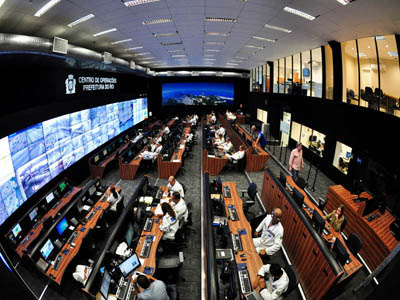To understand consumer attitudes around traffic congestion, the IBM Commuter Pain Index, illustrated in this speedometer graphic, ranks the emotional and economic toll of commuting in 20 international cities
IBM has today opened the IBM Smarter Cities Challenge grant program to new applications for 2012. Smarter Cities Challenge is a three-year, 100-city, US$50m grant programme in which IBM’s top technical experts and consultants provide actionable advice to urban centres.
Already, in 2011, the IBM Smart Cities initiative has provided practical advice to dozens of cities spanning the globe.
The grant programme provides select applicant cities with access to teams of elite IBM employees who have specific expertise on urban-related areas, including finance, sustainability, public safety, and citizen services.
Each city grant is worth around US$400,000 in talent and technology, said IBM today. The deadline for 2012 grant applications is 16 December 2011.
The need to capitalise on the use of new technologies and approaches to address long-standing civic challenges has never been greater, said IBM executives today. Population growth is accelerating in cities. For instance in 2008, the United Nations, indicated that more than half the world’s population began living in cities for the first time in the world’s history. But while they represent so much promise for realizing the dreams and aspirations of so many, IBM today pointed out how cities also struggle with significant budgetary and operational challenges.
IBM Twitter conversation today
At 3.30pm (Eastern Standard Time), IBM’s Stanley S. Litow will discuss what it takes to become a smarter city on Twitter. To participate in the chat, log on to Twitter, follow @CitizenIBM, and Tweet using the hashtag #CityChat.
They analyse unique opportunities and challenges facing municipalities, particularly within the context of today’s challenging economic climate.
Then, after conferring with officials, citizens, businesses, academics and community leaders, the IBM teams recommend actions to make the delivery of services to citizens more efficient and innovative.
Issues addressed include jobs, health, public safety, transportation, social services, recreation, education, energy, and sustainability.
How will cities qualify?
As in 2011, selected applicants must demonstrate a commitment to using all publicly available urban data to help identify local problems and solutions.
To that end, IBM will provide special assistance to each winning city on the use of City Forward (http://www.cityforward.org), a free online tool it developed with public policy experts that explores trends and statistics in a visual way, and which can be adapted for the study of any number of issues across cities.
Looking at these issues in a more scientific, systematic fashion provides insight that can help shape public policy solutions to pressing municipal problems.
Issues that IBM’s consultants addressed this past year were diverse, ranging from transportation and public safety, to economic development and budgeting.
Rio gets involved in IBM Smarter Cities program

IBM worked with Rio to design a command center that integrates over 20 city departments to improve emergency response management and collaboration across the city. Predictive analytics capabilities use information to decide how to best react to current events and how to best plan for what is likely to happen in the future in order to minimise impact on Rio’s citizens
Cities are getting smarter
IBM Smarter Cities Challenge grants have already impacted the following initiatives in 2011:
Mecklenburg County, North Carolina
Cities and towns have agreed to create a common capital budget planning process and to co-ordinate even more closely with one another when creating and adopting budgets. They have also agreed to jointly identify development goals and put them into place; share neighborhood data; and measure performance.
Edmonton, Alberta
Edmonton had grappled with a high rate of traffic fatalities. It created and published a plan to improve traffic and pedestrian safety and efficiency. To support the effort, Edmonton is now actively analysing and acting on a variety of data; partnering with organisations to research and monitor trends; and measuring outcomes.
St. Louis, Missouri
Previously known for having a high crime rate, St. Louis has undertaken significant leadership and day-to-day operational changes to improve public safety. Measures include more formal and rigorous collaboration among the courts, police department, mayor’s office, prosecutors, and corrections officials. The goal is to use data to make more informed and nuanced criminal justice decisions.
Milwaukee, Wisconsin
Leaders, the city’s private sector, and local urban agriculture organisations are establishing an Urban Agriculture and Aquaponics Council to advance the aquaponics industry, an eco-friendly approach to agriculture that recycles water from fish farms to nourish crops without the use of soil. Participants want to collaborate more effectively to make food healthier and more profitable, available, and affordable — and in the process, create opportunity and local jobs.
Successful Smart Cities applications
IBM says key factors for a successful grant application include:
- Strong city leadership;
- Willingness to collaborate with many stakeholders;
- The desire to make their cities smarter and more efficient;
- Cities will also need to champion actionable and measurable efforts that have the potential to make a real impact on the lives of their citizens; and
- Winning applicants must also identify areas that are closely connected with a city’s top priorities, and involve a range of disciplines and departments.
“Last year, we were gratified to receive literally hundreds of Smarter Cities Challenge grant applications worldwide. In 2012, we expect the demand for Smarter Cities Challenge grants to significantly increase,” said Stanley S. Litow, IBM vice-president of Corporate Citizenship & Corporate Affairs, and President of IBM’s International Foundation, today.
“The success in year-one ought to increase demand this year and next. We look forward to reviewing the proposals of the many creative, forward-thinking city leaders who are striving for excellence.”
The Smarter Cities Challenge is sponsored by IBM’s Corporate Citizenship program and IBM’s International Foundation.